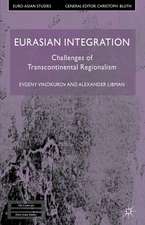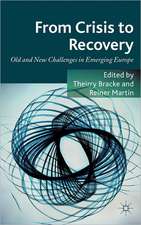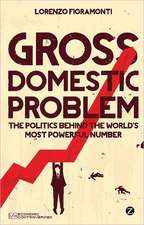German Annual of Spatial Research and Policy 2010: Urban Regional Resilience: How Do Cities and Regions Deal with Change?: German Annual of Spatial Research and Policy
Editat de Bernhard Mülleren Limba Engleză Paperback – 27 ian 2013
| Toate formatele și edițiile | Preț | Express |
|---|---|---|
| Paperback (1) | 939.00 lei 6-8 săpt. | |
| Springer Berlin, Heidelberg – 27 ian 2013 | 939.00 lei 6-8 săpt. | |
| Hardback (1) | 942.63 lei 6-8 săpt. | |
| Springer Berlin, Heidelberg – 21 dec 2010 | 942.63 lei 6-8 săpt. |
Preț: 939.00 lei
Preț vechi: 1145.13 lei
-18% Nou
Puncte Express: 1409
Preț estimativ în valută:
179.68€ • 187.23$ • 148.77£
179.68€ • 187.23$ • 148.77£
Carte tipărită la comandă
Livrare economică 03-17 aprilie
Preluare comenzi: 021 569.72.76
Specificații
ISBN-13: 9783642266393
ISBN-10: 3642266398
Pagini: 180
Ilustrații: XIV, 166 p.
Dimensiuni: 155 x 235 x 9 mm
Greutate: 0.26 kg
Ediția:2011
Editura: Springer Berlin, Heidelberg
Colecția Springer
Seria German Annual of Spatial Research and Policy
Locul publicării:Berlin, Heidelberg, Germany
ISBN-10: 3642266398
Pagini: 180
Ilustrații: XIV, 166 p.
Dimensiuni: 155 x 235 x 9 mm
Greutate: 0.26 kg
Ediția:2011
Editura: Springer Berlin, Heidelberg
Colecția Springer
Seria German Annual of Spatial Research and Policy
Locul publicării:Berlin, Heidelberg, Germany
Public țintă
ResearchCuprins
Urban Resilience and New Institutional Theory – A Happy Couple for Urban and Regional Studies?.- Given the Complexity of Large Cities, Can urban resilience be Attained at all?.- Rebuild the City! Towards Resource-efficient Urban Structures through the Use of Energy concepts, Adaptation to Climate Change, and Land Use Management.- Urban Restructuring – Making „More“ from „Less“.- Resilience and Resistance of Buildings and Built Structures to Flood Impacts – Approaches to Analysis and Evaluation.- Accommodating Creative Knowledge Workers? Empirical Evidence from Metropoles in Central and Eastern Europe.- Path Dependency and Resilience. The Example of Landscape Regions.- Vulnerability and Resilience: A Topic for Spatial Research from a Social Science Perspective.- A Strategy for Dealing with Change: Regional Development in Switzerland in a Context of Social Capital.- Planning for Risk Reduction and Organizing for Resilience in the Context of Natural Hazards
Recenzii
From the reviews:
“This is a relevant book as it introduces international readers to the state of discussion within some German research institutes. … it outlines many topics that would deserve more attention both within the German discourse but also on an international level. … this book underlines that resilience is a term that despite its fluidity and its multiple meanings, interpretation and conceptualizations stimulates exchange and discussion among and between disciplines.” (Christian Kuhlicke, Erdkunde, Vol. 66 (4), 2012)
“This is a relevant book as it introduces international readers to the state of discussion within some German research institutes. … it outlines many topics that would deserve more attention both within the German discourse but also on an international level. … this book underlines that resilience is a term that despite its fluidity and its multiple meanings, interpretation and conceptualizations stimulates exchange and discussion among and between disciplines.” (Christian Kuhlicke, Erdkunde, Vol. 66 (4), 2012)
Textul de pe ultima copertă
Resilience is increasingly becoming a catchword in current discussions about urban and regional development. While there has been a strong research focus on sustainability, there is a lack of understanding of the processes and factors that make cities and regions more vulnerable and others more resilient, for example, when dealing with climate change, demographic decline and ageing, as well as economic crises. The German Annual of Spatial Research and Policy 2010 sheds some light on this by discussing examples of how actors deal with change. On the one hand, concepts are described and analysed which are oriented towards increasing urban regional resilience, for example regarding energy consumption, climate change, and urban decline. Moreover, institutional aspects are discussed. On the other hand, barriers for using the concept of resilience in planning are described and suggestions are made about how to deal with these barriers in strategic planning.
Caracteristici
Examines problems and research results in the field of spatial research and planning Stimulates important discussions on new disparities in Europe Includes supplementary material: sn.pub/extras



















